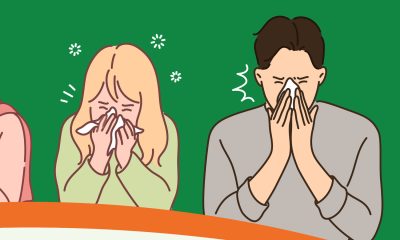Junk food should carry health warnings like cigarettes, says new research
Published
2 years ago onBy
Talker NewsBy Mark Waghorn via SWNS
Ready meals, frozen pizzas, cookies and cakes should carry cigarette-style front of packet health warnings, according to new research.
Ultra-processed foods - which also include burgers, sausages, candy and ice creams - are the 'new tobacco,' say public health experts.
Most people are in the dark about the consequences of eating them - after being left bamboozled by clever marketing.
Stronger messages are needed to enable consumers to make more informed choices.
Lead author Trish Cotter, of New York-based Vital Strategies, said: "The industrial processing, as well as the cocktail of additives, flavours, emulsifiers and colours they contain to give flavour and texture, make the final product hyperpalatable or more appealing and potentially addictive, which in turn leads to poor dietary patterns."
More than half the calories the average person in the UK eats come from ultra-processed foods - increasing the risk of obesity.
They range from smoked and cured meats, cheeses, fresh bread and bacon to sweets, chocolates, biscuits and cakes.
Writing in BMJ Global Health, the US team say urgent action is needed to spell out the full extent of their harm.
The products have been chemically or physically transformed using industrial processes. They are high in salt, sugar and saturated fats.
They usually take the form of packaged foods that are ready-to-eat, contain more than five ingredients and have a long shelf life.
Ms Cotter and colleagues said processed foods are "among the most aggressively promoted and marketed products in the world."
Sales are growing rapidly in low- and middle-income countries. Billions of people are likely to be at heightened risk of type 2 diabetes, heart disease, stroke, depression and death as a result.
The researchers said a study in Colombia and Brazil found people do not recognize the term 'ultra-processed products' - but know they are harmful.
But their own analysis showed they are also associated with positive emotions.
These include satisfying cravings, being tasty and bringing joy - all of which might be the result of "decades of persuasive marketing by the food industry."
Ms Cotter said: "Much as marketers build a brand, the public health community needs to build meaning around the term 'ultra-processed.'

"The public health community has been notoriously negligent of public health messaging and branding."
The researchers cited the term 'non-communicable disease' as an example.
This is "a clunky, technical term that defines an important category of diseases - cancer, heart disease, diabetes and more - by what they are not, and is little known outside public health circles," they said.
The success of tobacco control offers a useful lesson in how to tackle the major health threat.
Ms Cotter said it is a shining example of "huge policy wins and strong public understanding of the consequences of consuming a dangerous product.
"Much of this success is a result of using tried and tested marketing techniques, coupled with faithful adherence to the science of tobacco’s harms.
"It is time to invest in establishing the negative brand identity that ultra-processed foods and beverages deserve.
"We could start by taking lessons learnt from tobacco control to build public awareness and campaigns that reveal the true nature of these products and the looming threat to consumers’ health."
The researchers called for warning labels similar to those found on the front and back of packs of cigarettes.
These could be further strengthened by incorporating an ultra-processed warning label "to signal an independent, additional measure of unhealthiness."
They also want public education campaigns directly linking the products to serious ill-health.
Added Ms Cotter: "If we are to stave off the devastation to our food system and our health, governments, with the support of the global public health community, need to urgently implement effective strategies that lead to decreasing consumption of these unhealthy products and enable healthier choices."
It's estimated that a staggering one in three adults are obese.
Last year health experts in the UK said ministers should regulate processed food as heavily as tobacco to tackle the obesity crisis.
They recommended severe restrictions on supermarket promotions of processed foods.
They also advised bans on fast food outlets near schools, and TV adverts for pizzas, burgers and similar foods before 9 pm.
One campaign group even urged the government to consider plain packaging for processed food.
Boris Johnson declared a "war on obesity" after weight was identified as a major factor in deaths from Covid-19.
Britain has been dubbed the 'fat man' of Europe with two in three adults overweight.
Mr Johnson has said his time in intensive care after contracting the virus - when he weighed more than 17 stone – changed his "libertarian" views on food and obesity.
Richard Murray, chief executive of the King’s Fund, said: "Think what was done with tobacco.
"Don't let it brand, limit how much can be sold, tax it – use every possible route.
"You're not going to find the magic bullet right away, but there's got to be a genuine recognition that this is a massive national challenge."
Stories and infographics by ‘Talker Research’ are available to download & ready to use. Stories and videos by ‘Talker News’ are managed by SWNS. To license content for editorial or commercial use and to see the full scope of SWNS content, please email [email protected] or submit an inquiry via our contact form.
You may like


Metals can heal themselves just like ‘The Terminator’


Two-faced star has hydrogen on one side and helium on other


World’s oldest big game hunting weapon found


An espresso a day could keep Alzheimer’s at bay


Being bipolar significantly raises risk of premature death: study


Soccer players who regularly use head more likely to develop Alzheimer’s
Other Stories


Blood test can detect signs of knee condition 8 years before X-rays
Early detection could lead to treatments that slow the progression of the most common form of arthritis.


Man captures ultra rare albino squirrel on camera
The white squirrel has red eyes so is thought to be an albino squirrel.


Adorable dog kicks his leg while he walks
A video captured the pup bouncing along the street of his native China.


Woman with rare ‘Sleeping Beauty’ condition sleeps every four hours
She was diagnosed at age 18 after years of struggling to stay awake in school and nodding off during class.


97-year-old veteran receives WWII service medal 80 years later
"We’re all so proud of Eve."
Top Talkers

 Parenting1 week ago
Parenting1 week agoSingle mom details struggles of feeding her 12 kids

 Lifestyle1 week ago
Lifestyle1 week agoWoman regrets her tattoo nightmare: ‘It’s horrendous’

 Wildlife3 days ago
Wildlife3 days agoClever elephant returns visitor’s shoe that fell into enclosure

 Good News4 days ago
Good News4 days agoDisabled student takes first steps in 10 years on graduation stage

 Health4 days ago
Health4 days agoNew study reveals ‘old age’ begins later than it used to

 Entertainment1 day ago
Entertainment1 day agoWhat is the perfect movie length?

 Broadcast10 hours ago
Broadcast10 hours agoAre allergies interfering with your social life?

 Travel4 days ago
Travel4 days agoOne-fifth of Americans think about their next vacation while still on vacation

